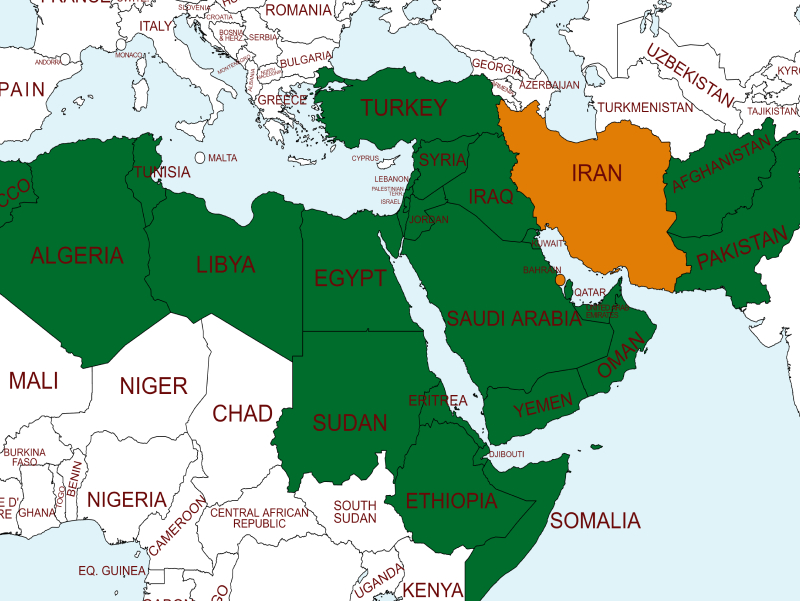
The Kingdom of Bahrain is another in a series of proxy conflict sites between the Islamic Republic of Iran and the Kingdom of Saudi Arabia. Since gaining independence in 1971, this island nation located in a small bay between the coasts of Qatar and Saudi Arabia has long been a "target" of the Iranian authorities. However, under pressure from the United Nations, in addition to officially recognizing Bahrain as an independent state, Iran has publicly renounced its claims to Bahraini territory. Nevertheless, it seems that in the last fifteen years, whenever the need arises, officials, and often journalists as well, have raised the issue of Iran's desire for a kind of subjugation of Bahrain. There are numerous reasons for this policy of Iran, and the most common is the oppression of the Bahraini Shiite population by the Sunni royal family and the ruling elite. As in most conflicts in the Middle East, which are at least primarily religious in nature, Riyadh appears as a protector of Sunnis, while Tehran represents the Shiite side.
The strained relations between the two countries have been going on since 1981 and the unsuccessful coup d'état carried out by the Shiite militant group called The Islamic Front for the Liberation of Bahrain (IFLB). The small island kingdom immediately accused Iran of financing and supporting this group, although Tehran on the other hand, sharply denied all accusations, except the fact that the Iranian Islamic revolution perhaps inspired members of the IFLB. Following the unsuccessful coup, authorities in Manama arrested a large number of Shiites in the country and thus practically prevented any further normalization of relations or cooperation with Iran. This lasted until 2007 when the then President of Iran Mahmoud Ahmadinejad visited Bahrain and negotiated with King Hamad bin Isa al-Khalifa on the resumption of economic cooperation. However, this was only a short-lived episode of normalized relations between the two countries, since a new setback occurred in 2011.
During the protests in Bahrain that year, Iran openly sided with the demonstrators. This is not surprising, considering that most of them were Shiites. The mutual withdrawal of ambassadors, as well as a new severance of diplomatic relations, occurred as a result. During the demonstrations, the protesters mostly complained about the problematic policy of the royal family towards the Shiite population, although some sources indicate that partial reasons also lie in the too liberal policy of the state authorities regarding certain spheres of public life. This claim is supported by the fact that Bahrain is a close and extremely important ally of Saudi Arabia and the United States, and it will undoubtedly follow Saudi policy in the future as much as possible.
On the other hand, the Kingdom of Saudi Arabia, which, truth be told, is increasing the degree of modernization of its society, is also very successfully preventing the spread of democracy in the Arabian Peninsula, and it is unlikely that Bahrain will pursue the opposite policy. There is no doubt that without the help of Riyadh, the authorities in Bahrain would certainly not have been able to quell the protests alone. Thus, it seems, this kingdom has been reduced to a puppet state under Saudi patronage, which will be especially pronounced in the period ahead, since, although mostly Shiite, the Kingdom of Bahrain does not have the capacity to resist Saudi influence.
The events from 2016 also confirmed to what extent Bahrain is a loyal ally of Saudi Arabia and how much it follows the foreign policy of the al-Saud family. The Saudi embassy in Tehran was at that time attacked by Iranian religious fanatics (as well as the consulate in Mashhad), and Bahrain, as expected, immediately condemned the attacks and seven days later suspended all commercial flights on the Manama-Tehran route. Since then, bilateral ties have been frozen and the communication between the two countries is virtually non-existent.
The introduction to that, it seems, came a year earlier when the Bahraini authorities withdrew their ambassador from Iran and expelled the Iranian charge d'affaires from Manama, due to "constant Iranian interference in the internal politics of the Kingdom". The same year five people were arrested in Bahrain on charges of collaborating with Hezbollah (which Manama considers a terrorist organization) as well as with the Islamic Revolutionary Guard Corps (IRGC).
The fact that the religious aspect is at the heart of the problem between Bahrain and Iran was confirmed once again during the summer of 2016. Bahraini authorities then revoked Isa Qassim’s citizenship accusing him of abusing his position and status among the Shiite population in Bahrain and of working in the interests of a foreign power - Iran. Ayatollah Isa Qassim is the spiritual leader of the Bahraini Shiites and is, therefore, a thorn in the side of the royal family. At the same time, Qassim was an extremely important weapon in the hands of the authorities in Tehran who supported and helped his work, intending to spread the Shiite branch of Islam in the kingdom. Iran then sharply criticized the moves of the Bahraini royal family and even pointed out that this could initiate much bigger open conflicts in the country between Shiites (60% of the population) and minority Sunnis. However, Saudi Arabia's continued support allows King Hamad bin Isa al-Khalifa not to pay too much attention to the accusations coming against him from Tehran.
The last stage in the relations between Iran and Bahrain could be an additional millstone around the neck for the authorities in Tehran. Namely, when it was announced that the UAE and Israel would normalize relations, through the United States, Bahrain quickly joined the negotiations. Tehran saw this as a kind of a betrayal of Islam committed by Manama and Abu Dhabi, given that it considers the Israeli state its arch-enemy. In addition to sharp opposition, open warnings can be heard from Iran that the alliance of Islamic states with Israel could seriously disrupt the stability of the Islamic world and cause unwanted problems.
However, it is clear that such statements are the last resort of Tehran since it is no longer only surrounded by hostile states, but they have all become closer in recent years, which can lead to the creation of a kind of anti-Iranian coalition. Although for now there are no indications that such an alliance is in the making, the common policy of most Gulf countries and their allies is evident, and Iran is the only common opponent of practically each of these countries.
Translation: Tamara Djordjevic
Proofreading: Nikola Petrovic


